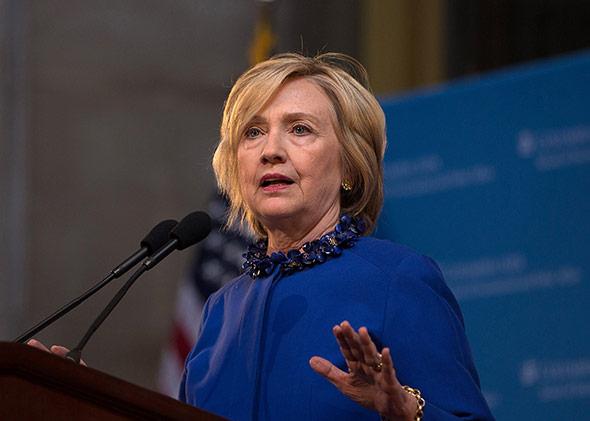There’s plenty to quibble with in Hillary Clinton’s speech on mass incarceration and criminal justice reform, which she gave on Wednesday at Columbia University. She doesn’t make mention of the 1994 crime bill, signed by her husband, which pushed states to build—and fill—more prisons with more offenders. She treats mass incarceration as a function of nonviolent crime, when the truth is more difficult. Half of the people in state prisons are there for violent crimes, and many nonviolent offenders have violent histories. To reduce incarceration, we need to rethink punishment for violent offenders, too. There, Clinton is silent.
But the problems and omissions in Clinton’s speech shouldn’t blind us to the fact that it’s a remarkable piece of political rhetoric, both in its own right and for what it says about American politics in 2015.
Two days after riots in Baltimore—at a time when most of the presidential field is either silent or contemptuous—Clinton has stepped out front with a forward-looking agenda on bringing people out of prison, a definitive rebuke to the “law and order” politics used by her husband throughout his career. Not only did Clinton call for an end to “the era of mass incarceration,” but she also connected our prison population to broader patterns of inequality. “Without the mass incarceration that we currently practice, millions fewer people would be living in poverty,” she said. “And it’s not just families trying to stay afloat with one parent behind bars. Of the 600,000 prisoners who re-enter society each year, roughly 60 percent face long-term unemployment.”
We have to do more than release nonviolent offenders to solve mass incarceration, but this at least shows that Clinton is thinking in broad terms. Reducing the prison population is the beginning of the project. What comes next—reintroducing former inmates into mainstream society and giving them a chance to succeed—is just as important.
Likewise, Clinton is clearly giving thought to how we restructure policing and punishment. In the speech, she promises to make sure that “federal funds for state and local law enforcement are used to bolster best practices, rather than to buy weapons of war that have no place on our streets.” She calls for body cameras on all police—a major goal of the “Black Lives Matter” movement—supports better, “swifter” probation programs, and stresses help for mental health patients. “You and I know that the promise of de-institutionalizing those in mental health facilities was supposed to be followed by the creation of community-based treatment centers. Well, we got half of that equation—but not the other half.”
On a more prosaic note, Clinton alludes to high-profile cases of police abuse and racial violence, directly identifying with black and Latino families on an issue that is polarizing with white Americans. “You don’t have to look too far from this magnificent hall to find children still living in poverty or trapped in failing schools,” she says, “Mothers and fathers who fear for their sons’ safety when they go off to school—or just to go buy a pack of Skittles.”
What’s important about this, beyond public policy, is that it’s a sign of where Clinton sees the electorate. A Hillary Clinton who believed she needed working class whites to win is not a Hillary Clinton who would embrace this agenda for police reform, or use this rhetoric. No, this Clinton clearly believes that she needs to reconstitute the Obama coalition to win, and to do that, she’ll push forward on key issues for black Americans, Latinos, young women, and other members of the Obama electorate. Put differently, this speech is a political gamble as much as it is a policy commitment.
To some, that sounds cynical. And maybe it is. But it also doesn’t matter. Political science is clear: Presidential candidates don’t make idle promises. When they make a commitment or signal a priority, they try to follow through, and when they don’t, the party tries to hold them accountable. Now, Clinton is on the record, and if elected, she’ll face the kind of pressure that makes policy happen.
On that, it’s worth a final point. Four years ago, body cameras weren’t a priority for national politicians. Now, the Democrats’ presumptive nominee for president—who may win next year—has endorsed them for all police officers. Even if its not a panacea for broad problems of police violence, it’s still a victory. Not just because Clinton has made the commitment, but because she’s sent a powerful signal to other Democrats (and even some Republicans) to treat police reform as a mainstream issue. Competitors like Sen. Bernie Sanders and former Maryland Gov. Martin O’Malley may try to outflank her, but potential allies, either in Congress or elsewhere, will support her message and her leadership. Suddenly, police reform is a Democratic agenda item, something a Democratic Congress and a Democratic White House may act on.
For police reform activists, this is vindication. This is what winning looks like.
